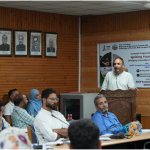Pulwama, Nov 03: After successful trial demonstration of various millet species in plains of Kashmir, Scientists of Shar e Kashmir University of Agriculture Sciences and Technology Kashmir ( SKUAST-K) are working on developing a practice package for cultivation of these alternative food crops in the valley.
The experts revealed to Rising Kashmir that they are optimistic to transfer this practice package on cultivation of millets in Kashmir to farmers by next year.
Professor Mohammad Ashraf Bhat, Head Division of Plant Biotechnology, SKUAST-K, is the principal investigator for development of Millet Project in Kashmir under Holistic Development of Agriculture Programme.
He explained that millets are a group of small seeded crops belonging to Gramineae family.
He told Rising Kashmir that some millets like Proso millet (Panicum miliaceum) and Foxtail millet (Setaria italica) were grown in hilly areas of Kashmir and Ladakh from ancient times.
However, over the past many years the cultivation of these traditional millet varieties started dwindling after farmers turned to other crops which include rice, maize, oats and wheat.
The expert explained that this shift resulted in these traditional millet crops facing the threat of extinction.
He said that a project for revival of millet crops in Kashmir was approved under Holistic Agriculture Department Programme (HADP).
He further added that they obtained seeds for other millet species like Kudo millet (Paspalum scrobiculatum) and Barnyard millet (Echinochloa frumentacea) from various national and international centres which include International Crops Research Institute for the Semi-Arid Tropics (ICRISAT), Hyderabad and Indian Institute of Millet Research, Hyderabad.
“This gives me immense pleasure to share the news that our University has been successful in cultivation of these millets in plains of Kashmir,” Bhat said, adding that they are working on developing a practice package for growing millets.
He said that they have collected data from the previous year.
He said that they will pass on recommendations on sewing pattern, requirement of soil type, fertilizers and irrigation, to farmers once they obtain data for one more year.
The scientist explained that in view of an increase in population by 2050 and corresponding decrease in natural resources, millets assume a great significance as alternative food to rice and bread.
“These are environmentally resilient crops which require less water and fertilizers” he said, adding that millets are a smart food for future generations with significant health benefits.
He narrated that millets are good for Anemia prevention, Digestive health, Cholesterol control, help in Detoxification and Diabetes management besides having Cancer prevention Properties.
SKUAST working on developing practice package for millet cultivation

Leave a Comment
Leave a Comment







